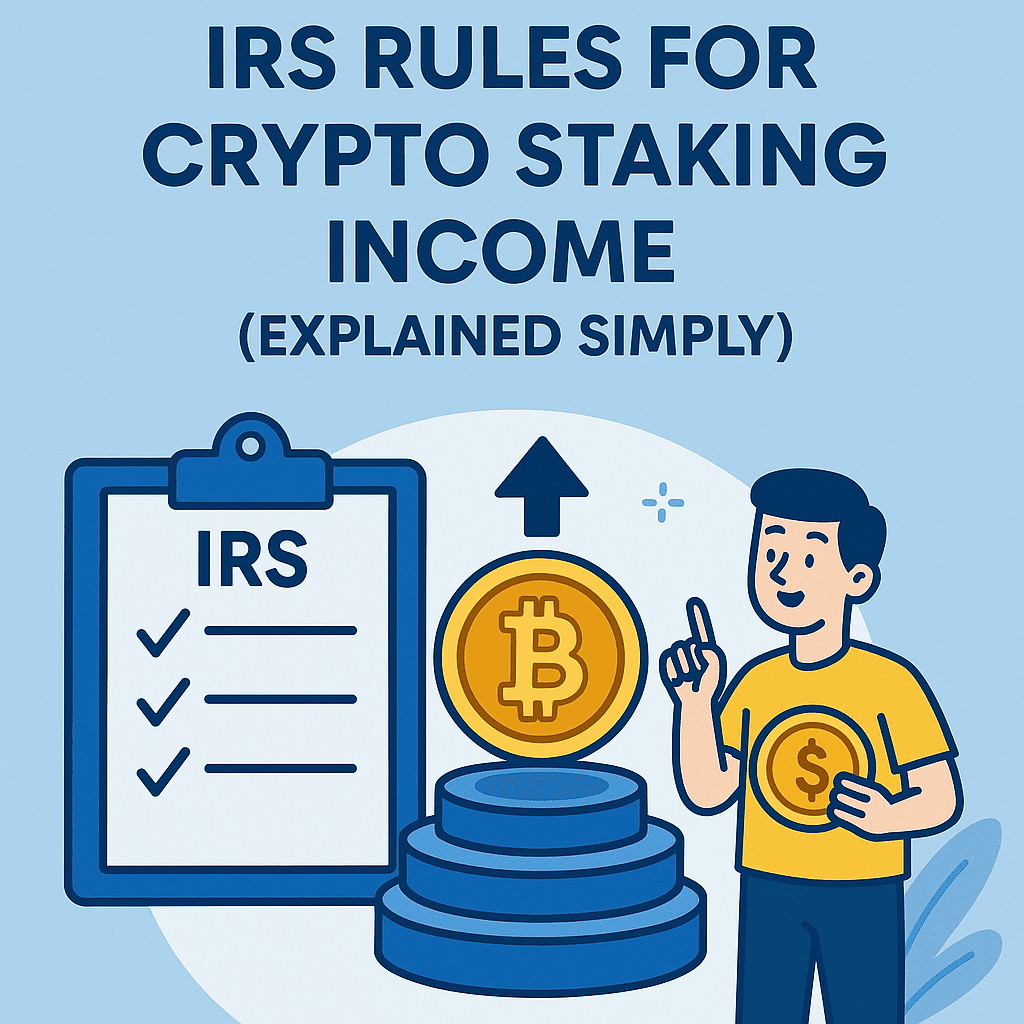IRS Rules for Crypto Staking Income (Explained Simply)
By Abhishek Chandravanshi

Cryptocurrency staking has quickly become one of the most popular ways for investors to earn passive income in 2025. But as staking gains momentum, so does the attention it receives from the IRS. If you’re staking your crypto on exchanges like Coinbase, Kraken, or Binance, you may be wondering how this income is taxed — and more importantly, how to report it properly.
In this guide, we’ll explain IRS rules for crypto staking income (explained simply) so that anyone — even if you’re not a tax professional — can understand. We’ll walk through the basics, break down tax classifications, talk about how and when to report staking rewards, and link you to key tools like our crypto staking calculator to help you estimate your earnings more accurately.
🧠 Featured Snippet Outline:
What are the IRS rules for crypto staking income?
The IRS treats crypto staking income as taxable when it is received. Rewards are taxed as ordinary income at fair market value when credited to your account. If you later sell the staked tokens, capital gains tax may also apply. Proper tracking and reporting are essential.
1. What Is Crypto Staking?
Crypto staking is the process of locking up cryptocurrency to help secure a blockchain network in exchange for rewards. It’s similar to earning interest on a savings account — but instead of a bank, you’re supporting a decentralized network like Ethereum or Polkadot.
For example, when you stake ETH on Kraken or Coinbase, you’re contributing to Ethereum’s proof-of-stake protocol and earning rewards in return. Learn how much you can earn staking ETH.
2. Is Staking Income Taxable?
Yes, staking rewards are considered taxable income by the IRS. This includes:
- Rewards earned from centralized exchanges like Binance, Kraken, or Coinbase
- Rewards from DeFi staking protocols
- Tokens distributed from validator nodes or staking pools
The IRS taxes staking income in the same way it taxes interest or dividends — it’s reported as ordinary income at the time you receive it.
3. How Does the IRS Classify Staking Rewards?
Here’s how the IRS generally views staking income:
| Type of Income | Tax Treatment |
|---|---|
| Staking Rewards | Ordinary Income |
| Selling Staked Coins | Capital Gains/Losses |
So when you earn staking rewards, you must report the fair market value (FMV) of those rewards as income. If you later sell those coins at a different price, you must report a capital gain or loss based on the difference.
4. When Do You Pay Taxes on Staking Rewards?
You pay taxes on staking income when you have control over the tokens, even if you don’t withdraw them.
For example:
- If you earn 1 SOL on January 5th, and it’s worth $100 that day — you’ll report $100 as income for that tax year.
- If you later sell that SOL when it’s worth $150, you’ll pay capital gains tax on the $50 difference.
5. How to Report Staking Income on Taxes
You’ll report your staking rewards as “Other Income” on Schedule 1 (Form 1040). Here’s how:
- Track the date and value of each staking reward.
- Report the total dollar value earned during the year.
- Include the staking platform name and currency type.
- Use crypto tax software or a CPA for accuracy.
For capital gains from selling those rewards, you’ll also use Form 8949 and Schedule D.
Want a quick estimate of your staking returns? Try our staking rewards calculator.
6. Staking on Exchanges vs. Wallets: Does It Matter?
Yes, the method you use to stake can affect your reporting:
- Exchange Staking (e.g., Binance, Kraken): They may issue 1099 forms or track earnings for you.
- DeFi Staking (e.g., Lido, Rocket Pool): You must manually track the FMV of rewards.
This makes it crucial to choose staking platforms that provide good reporting tools. See our live APY staking rates page to compare platforms.
7. Cost Basis and Recordkeeping Tips
The IRS expects accurate recordkeeping. Here’s what you need:
- Date received
- Token amount
- USD value at the time
- Wallet or exchange used
- Transaction hash (optional)
Crypto tax tools like CoinTracker, Koinly, or TokenTax can help automate this. But it’s always good to keep a manual backup.
8. How the IRS Tracks Crypto Staking
The IRS has ramped up efforts to monitor crypto earnings. Here’s how they might find out about your staking income:
- 1099-MISC or 1099-NEC forms from exchanges
- Blockchain analytics tools
- Your response to the “Did you receive crypto?” checkbox on your 1040
Even if you didn’t receive a tax form, you’re still required to report. Non-compliance can result in penalties and audits.
9. Common Mistakes to Avoid
- ❌ Not reporting staking income at all
- ❌ Using the wrong FMV (use the date reward was received, not when it was sold)
- ❌ Missing DeFi staking income
- ❌ Failing to report capital gains from staking rewards sold later
Avoiding these errors can save you from unnecessary IRS scrutiny.
10. Tools to Help You Stay Compliant
Here are some popular tools to help track staking income and file taxes correctly:
| Tool | Features |
|---|---|
| Koinly | Auto-imports staking transactions |
| CoinTracker | Integrates with exchanges like Kraken |
| Accointing | Clean UI and tax preview tools |
| TokenTax | CPA + software combo for complex filings |
For U.S. users, we also recommend reading our Crypto Staking Tax Guide.
11. Final Thoughts on IRS Staking Rules
Navigating IRS rules for crypto staking income (explained simply) doesn’t have to be a headache. With the right tracking, tools, and understanding of taxable events, you can stay compliant and avoid costly mistakes.
As crypto staking evolves — especially with trends like restaking — tax guidance may continue to shift. Stay informed by bookmarking our CryptoTax News section.
12. FAQs
Q1. Do I owe taxes if I just stake and never sell?
Yes. You owe income tax the moment staking rewards are received — even if you never sell them.
Q2. What if I restake my rewards immediately?
You’re still taxed on the FMV at the time you receive the reward, regardless of whether you restake.
Q3. Do centralized platforms like Kraken or Coinbase send tax forms?
Yes, in many cases they issue 1099 forms for staking rewards.
Q4. Is staking considered self-employment income?
Generally, no. Staking is taxed as ordinary income, not self-employment income.
Q5. Can I deduct gas fees or validator expenses?
Possibly — if you’re running a validator node, some costs may be deductible. Check with a crypto-savvy CPA.

3 Comments